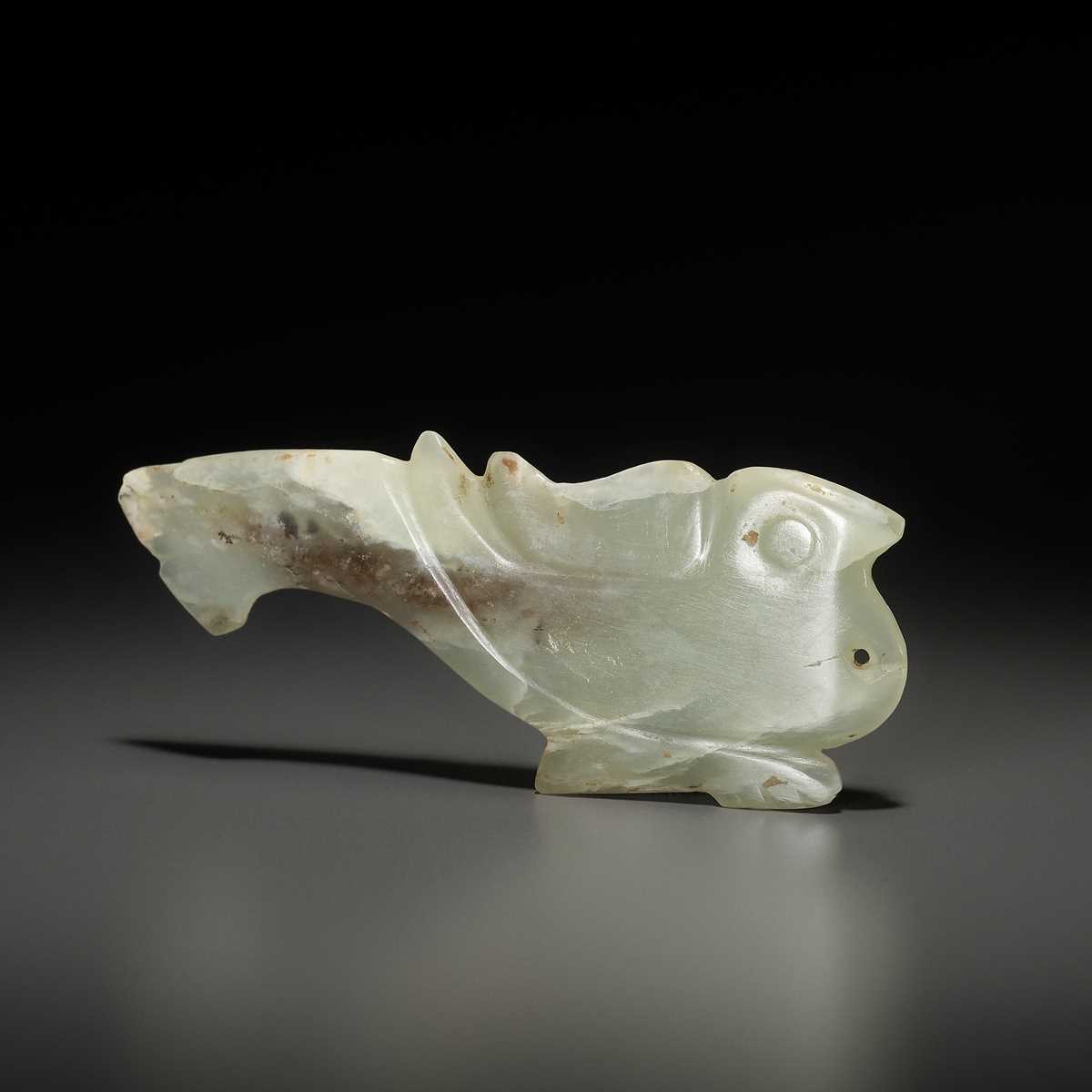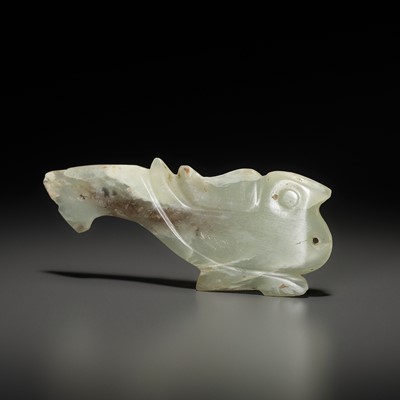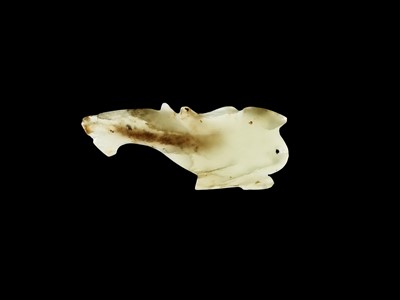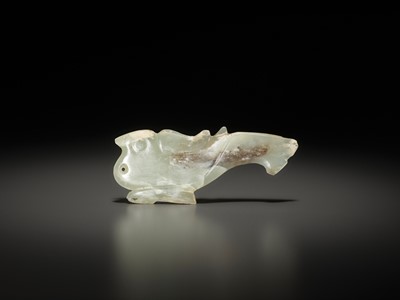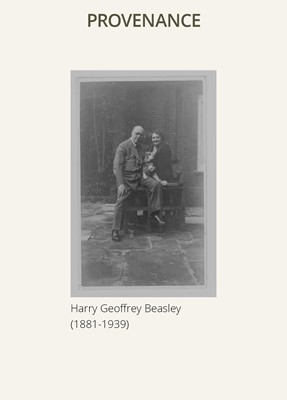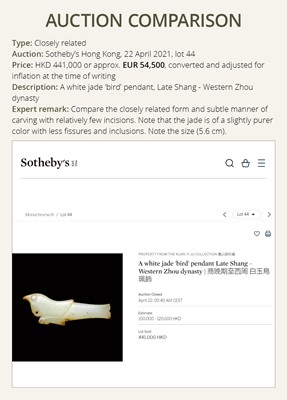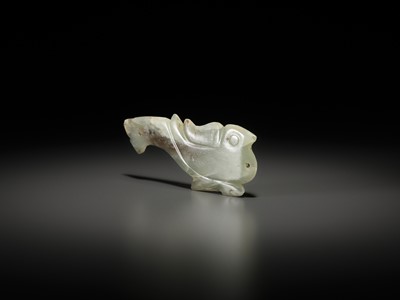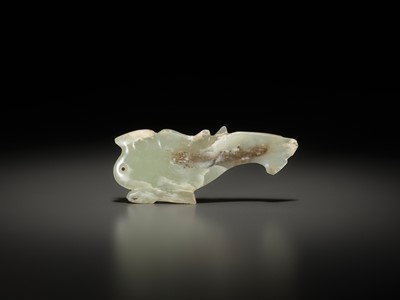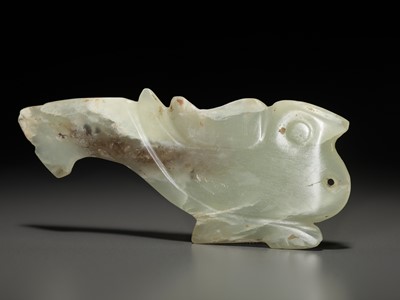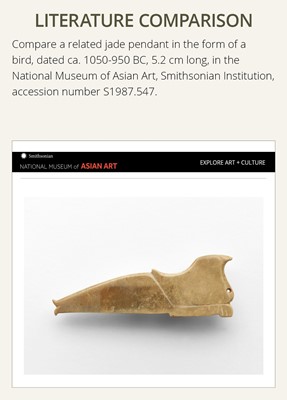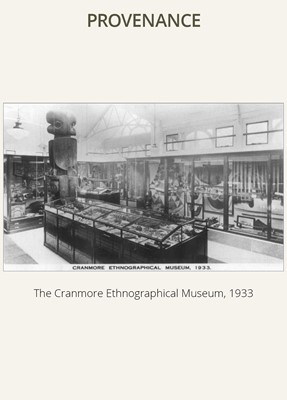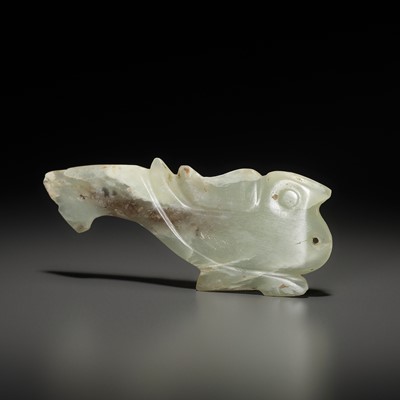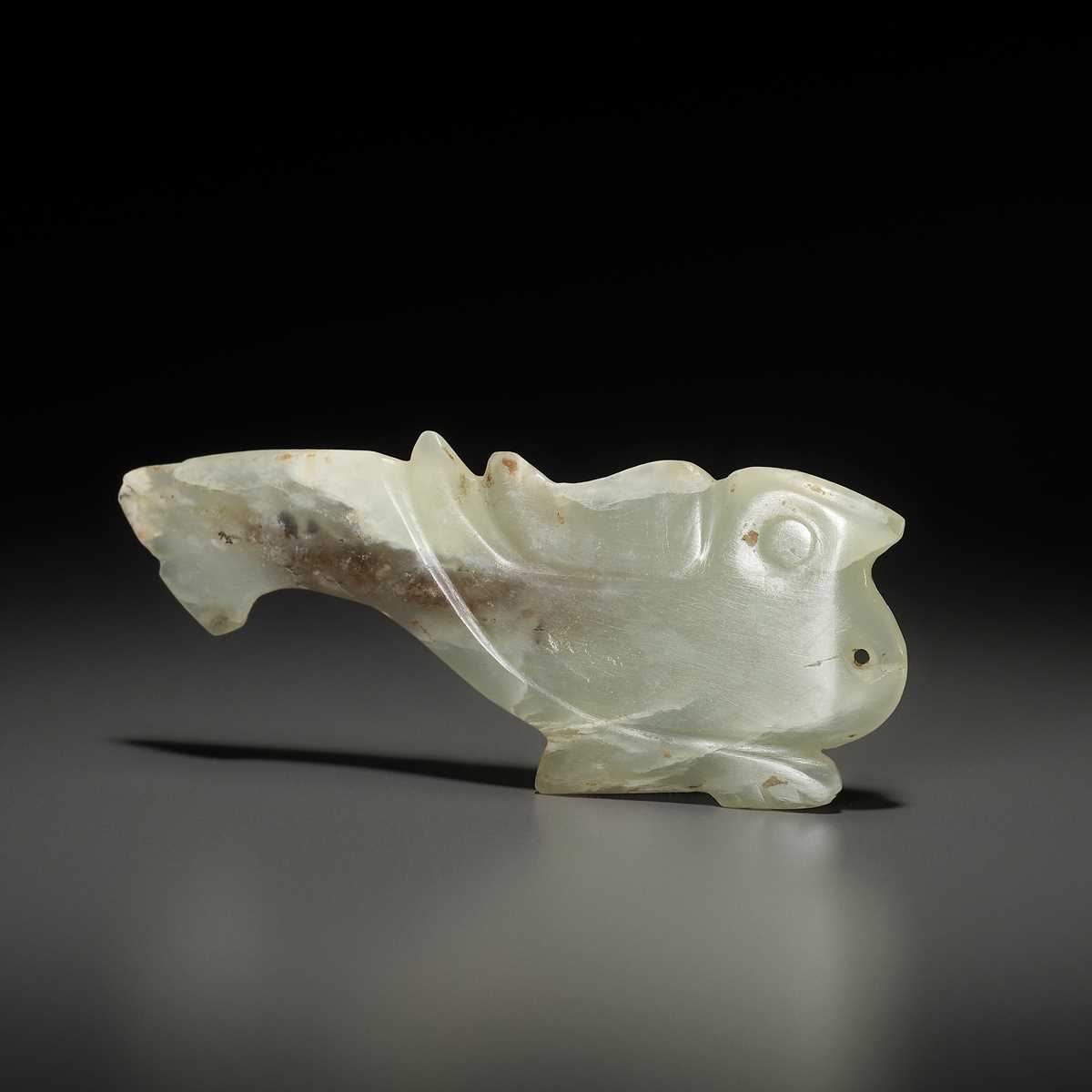1st Mar, 2024 10:00
The No Reserve Dragon Sale
50
A JADE ‘BIRD’ PENDANT, SHANG TO WESTERN ZHOU DYNASTY
商至西周鳥形玉飾
Sold for €650
including Buyer's Premium
Please note this Lot is to be sold at No Reserve. 本拍品不設底價
China, 12th-11th century BC. Of flattened shape, finely carved in the form of a bird in profile with a short sharp beak, large round eyes, subtly incised wings, and a long curved tail. The translucent stone shows a fine polish and is of a pale green tone with creamy-white and dark-brown patches as well as icy veins and small areas of calcification. One minuscule hole for suspension.
Provenance: Collection of Harry Geoffrey Beasley (1881-1939) and thence by descent to his widow Irene Beasley. Collection of Alfred William Cowperthwaite (1890-1964), acquired from the above c. 1939 and thence by descent in the same family. Harry Geoffrey Beasley (1881-1939) was a British anthropologist and museum curator who developed an important ethnographic collection during the early 20th century that is now held in various British museums. With his wife Irene, Beasley set up the Cranmore Ethnographical Museum which eventually held more than 6,000 objects of ethnographical interest. The Beasleys collected objects from across Europe, buying from auction houses and local museums to expand the collection, which contained material from the Pacific, Asia, Africa, and Northwestern America. Beasley wrote numerous articles for anthropological journals and was considered an expert in his field. He died in 1939 and his collection was stored with the British Museum collections during the war, which was fortunate, as the Cranmore Museum was destroyed by bombing. After the war, substantial portions of the collection were passed to the British Museum, the Royal Museum in Edinburgh, the Museum of Archaeology and Anthropology, the University of Cambridge, the Pitt Rivers Museum, and the Merseyside County Museum. Other pieces, such as the present lot, were sold by his widow and, after her death in 1974, by their daughters. Alfred William Cowperthwaite (1890-1964) was a contributor to the Cranmore Museum and became good friends with Harry Beasley. Shortly after Harry Beasley’s death, he acquired a number of objects from Irene Beasley, including the present lot.
Condition: Very good condition with expected old wear, some weathering, soil residue, minuscule nibbles. The stone with natural fissures, some of which have developed into small hairline cracks.
Weight: 11.7 g
Dimensions: Length 6.7 cm
Please click here to read the full description
Literature comparison:
Compare a related jade pendant in the form of a bird, dated ca. 1050-950 BC, 5.2 cm long, in the National Museum of Asian Art, Smithsonian Institution, accession number S1987.547.
Auction result comparison:
Type: Closely related
Auction: Sotheby’s Hong Kong, 22 April 2021, lot 44
Price: HKD 441,000 or approx. EUR 54,500, converted and adjusted for inflation at the time of writing
Description: A white jade ‘bird’ pendant, Late Shang - Western Zhou dynasty
Expert remark: Compare the closely related form and subtle manner of carving with relatively few incisions. Note that the jade is of a slightly purer color with less fissures and inclusions. Note the size (5.6 cm).
点此阅读中文翻译 (Chinese Translation)
商至西周鳥形玉飾
中國,公元前十二至十一世紀。呈扁平狀,陰線雕刻成鳥的輪廓,鳥喙短而尖,圓圓的大眼睛,巧妙切割的翅膀和長而彎曲的尾巴。 半透明的玉料經過精細打磨,呈淡綠色,帶有乳白色和深棕色斑紋,小面積鈣化。一個用於懸掛的小孔。
來源:Harry Geoffrey Beasley (1881-1939)收藏,他逝世後由其遺孀Irene Beasley保存;Alfred William Cowperthwaite (1890-1964),約於1939年購於上述收藏,之後在同一家族保存至今。Harry Geoffrey Beasley (1881-1939) 是一位英國人類學家和博物館館長,他在二十世紀初建立了一個重要的民族志收藏,現在收藏在英國的各個博物館中。Beasley和他的妻子Irene一起建立了Cranmore民族志博物館,該博物館最終收藏了 6,000 多件民族志方面的物品。Beasley 收集了來自歐洲各地的物品,從拍賣行和當地博物館購買以擴大收藏範圍,其中包含來自太平洋、亞洲、非洲和美國西北部的資料。Beasley為人類學期刊撰寫了大量文章,被公認爲是該領域的專家。他於 1939 年去世,他的藏品幸虧在戰爭期間被存放在大英博物館裏,而Cranmore博物館被轟炸摧毀。戰後,大部分藏品被轉移到大英博物館、愛丁堡皇家博物館、劍橋大學考古與人類學博物館、Pitt Rivers博物館和Merseyside County博物館。其他收藏,例如現在的拍品,由他的遺孀出售,在她 1974 年去世後,由他們的女兒出售。Alfred William Cowperthwaite (1890-1964) 曾是Cranmore 民族志博物館重要支持人,也曾是 Harry Beasley的好友。在Harry Beasley去世不久,他從Irene Beasley 處購買了一些收藏,包括此件拍品。
品相:狀況極好,有磨損、一些風化、土壤殘留物、微小的磕損。玉料有天然裂隙,有的已發展成細小的裂紋。
重量:11.7 克
尺寸:長 6.7 厘米
文獻比較:
比較一件相近的公元前1050年至950年鳥形玉珮,長5.2 厘米long ,收藏於史密森尼學會亞瑟·M·賽克勒美術館,收藏編號S1987.547.
拍賣結果比較:
形制:非常相近
拍賣:香港蘇富比,2021年4月22日,lot 44
價格:HKD 441,000(相當於今日EUR 54,500)
描述:商晚期至西周白玉鳥珮飾
專家評論:比較非常相近的外形,以及雕刻方式精巧,切口相對較少。請注意此玉石顏色稍純,裂紋、夾雜物較少。請注意尺寸(5.6厘米)。
Please note this Lot is to be sold at No Reserve. 本拍品不設底價
China, 12th-11th century BC. Of flattened shape, finely carved in the form of a bird in profile with a short sharp beak, large round eyes, subtly incised wings, and a long curved tail. The translucent stone shows a fine polish and is of a pale green tone with creamy-white and dark-brown patches as well as icy veins and small areas of calcification. One minuscule hole for suspension.
Provenance: Collection of Harry Geoffrey Beasley (1881-1939) and thence by descent to his widow Irene Beasley. Collection of Alfred William Cowperthwaite (1890-1964), acquired from the above c. 1939 and thence by descent in the same family. Harry Geoffrey Beasley (1881-1939) was a British anthropologist and museum curator who developed an important ethnographic collection during the early 20th century that is now held in various British museums. With his wife Irene, Beasley set up the Cranmore Ethnographical Museum which eventually held more than 6,000 objects of ethnographical interest. The Beasleys collected objects from across Europe, buying from auction houses and local museums to expand the collection, which contained material from the Pacific, Asia, Africa, and Northwestern America. Beasley wrote numerous articles for anthropological journals and was considered an expert in his field. He died in 1939 and his collection was stored with the British Museum collections during the war, which was fortunate, as the Cranmore Museum was destroyed by bombing. After the war, substantial portions of the collection were passed to the British Museum, the Royal Museum in Edinburgh, the Museum of Archaeology and Anthropology, the University of Cambridge, the Pitt Rivers Museum, and the Merseyside County Museum. Other pieces, such as the present lot, were sold by his widow and, after her death in 1974, by their daughters. Alfred William Cowperthwaite (1890-1964) was a contributor to the Cranmore Museum and became good friends with Harry Beasley. Shortly after Harry Beasley’s death, he acquired a number of objects from Irene Beasley, including the present lot.
Condition: Very good condition with expected old wear, some weathering, soil residue, minuscule nibbles. The stone with natural fissures, some of which have developed into small hairline cracks.
Weight: 11.7 g
Dimensions: Length 6.7 cm
Please click here to read the full description
Literature comparison:
Compare a related jade pendant in the form of a bird, dated ca. 1050-950 BC, 5.2 cm long, in the National Museum of Asian Art, Smithsonian Institution, accession number S1987.547.
Auction result comparison:
Type: Closely related
Auction: Sotheby’s Hong Kong, 22 April 2021, lot 44
Price: HKD 441,000 or approx. EUR 54,500, converted and adjusted for inflation at the time of writing
Description: A white jade ‘bird’ pendant, Late Shang - Western Zhou dynasty
Expert remark: Compare the closely related form and subtle manner of carving with relatively few incisions. Note that the jade is of a slightly purer color with less fissures and inclusions. Note the size (5.6 cm).
点此阅读中文翻译 (Chinese Translation)
商至西周鳥形玉飾
中國,公元前十二至十一世紀。呈扁平狀,陰線雕刻成鳥的輪廓,鳥喙短而尖,圓圓的大眼睛,巧妙切割的翅膀和長而彎曲的尾巴。 半透明的玉料經過精細打磨,呈淡綠色,帶有乳白色和深棕色斑紋,小面積鈣化。一個用於懸掛的小孔。
來源:Harry Geoffrey Beasley (1881-1939)收藏,他逝世後由其遺孀Irene Beasley保存;Alfred William Cowperthwaite (1890-1964),約於1939年購於上述收藏,之後在同一家族保存至今。Harry Geoffrey Beasley (1881-1939) 是一位英國人類學家和博物館館長,他在二十世紀初建立了一個重要的民族志收藏,現在收藏在英國的各個博物館中。Beasley和他的妻子Irene一起建立了Cranmore民族志博物館,該博物館最終收藏了 6,000 多件民族志方面的物品。Beasley 收集了來自歐洲各地的物品,從拍賣行和當地博物館購買以擴大收藏範圍,其中包含來自太平洋、亞洲、非洲和美國西北部的資料。Beasley為人類學期刊撰寫了大量文章,被公認爲是該領域的專家。他於 1939 年去世,他的藏品幸虧在戰爭期間被存放在大英博物館裏,而Cranmore博物館被轟炸摧毀。戰後,大部分藏品被轉移到大英博物館、愛丁堡皇家博物館、劍橋大學考古與人類學博物館、Pitt Rivers博物館和Merseyside County博物館。其他收藏,例如現在的拍品,由他的遺孀出售,在她 1974 年去世後,由他們的女兒出售。Alfred William Cowperthwaite (1890-1964) 曾是Cranmore 民族志博物館重要支持人,也曾是 Harry Beasley的好友。在Harry Beasley去世不久,他從Irene Beasley 處購買了一些收藏,包括此件拍品。
品相:狀況極好,有磨損、一些風化、土壤殘留物、微小的磕損。玉料有天然裂隙,有的已發展成細小的裂紋。
重量:11.7 克
尺寸:長 6.7 厘米
文獻比較:
比較一件相近的公元前1050年至950年鳥形玉珮,長5.2 厘米long ,收藏於史密森尼學會亞瑟·M·賽克勒美術館,收藏編號S1987.547.
拍賣結果比較:
形制:非常相近
拍賣:香港蘇富比,2021年4月22日,lot 44
價格:HKD 441,000(相當於今日EUR 54,500)
描述:商晚期至西周白玉鳥珮飾
專家評論:比較非常相近的外形,以及雕刻方式精巧,切口相對較少。請注意此玉石顏色稍純,裂紋、夾雜物較少。請注意尺寸(5.6厘米)。
Zacke Live Online Bidding
Our online bidding platform makes it easier than ever to bid in our auctions! When you bid through our website, you can take advantage of our premium buyer's terms without incurring any additional online bidding surcharges.
To bid live online, you'll need to create an online account. Once your account is created and your identity is verified, you can register to bid in an auction up to 12 hours before the auction begins.
Intended Spend and Bid Limits
When you register to bid in an online auction, you will need to share your intended maximum spending budget for the auction. We will then review your intended spend and set a bid limit for you. Once you have pre-registered for a live online auction, you can see your intended spend and bid limit by going to 'Account Settings' and clicking on 'Live Bidding Registrations'.
Your bid limit will be the maximum amount you can bid during the auction. Your bid limit is for the hammer price and is not affected by the buyer’s premium and VAT. For example, if you have a bid limit of €1,000 and place two winning bids for €300 and €200, then you will only be able to bid €500 for the rest of the auction. If you try to place a bid that is higher than €500, you will not be able to do so.
Online Absentee and Telephone Bids
You can now leave absentee and telephone bids on our website!
Absentee Bidding
Once you've created an account and your identity is verified, you can leave your absentee bid directly on the lot page. We will contact you when your bids have been confirmed.
Telephone Bidding
Once you've created an account and your identity is verified, you can leave telephone bids online. We will contact you when your bids have been confirmed.
Classic Absentee and Telephone Bidding Form
You can still submit absentee and telephone bids by email or fax if you prefer. Simply fill out the Absentee Bidding/Telephone bidding form and return it to us by email at office@zacke.at or by fax at +43 (1) 532 04 52 20. You can download the PDF from our Upcoming Auctions page.
How-To Guides
How to Create Your Personal Zacke Account
How to Register to Bid on Zacke Live
How to Leave Absentee Bids Online
How to Leave Telephone Bids Online
中文版本的操作指南
创建新账号
注册Zacke Live在线直播竞拍(免平台费)
缺席投标和电话投标
Third-Party Bidding
We partner with best-in-class third-party partners to make it easy for you to bid online in the channel of your choice. Please note that if you bid with one of our third-party online partners, then there will be a live bidding surcharge on top of your final purchase price. You can find all of our fees here. Here's a full list of our third-party partners:
- 51 Bid Live
- EpaiLive
- ArtFoxLive
- Invaluable
- LiveAuctioneers
- the-saleroom
- lot-tissimo
- Drouot
Please note that we place different auctions on different platforms. For example, in general, we only place Chinese art auctions on 51 Bid Live.
Bidding in Person
You must register to bid in person and will be assigned a paddle at the auction. Please contact us at office@zacke.at or +43 (1) 532 04 52 for the latest local health and safety guidelines.
